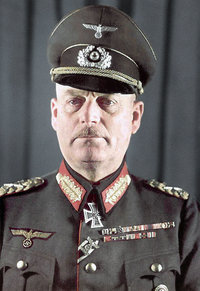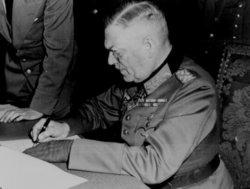Wilhelm Keitel
|
|
Wilhelm Bodewin Johann Gustav Keitel (September 22, 1882 – October 16, 1946) was a German Field Marshal (Generalfeldmarschall) and a senior military leader during World War II.
Early life and career
He was born in Helmscherode near Hanover, Germany, the son of Carl Keitel, a middle-class landowner. He was a career soldier, after education in Göttingen he became a Fahnenjunker (Cadet Officer) in 1901 and joined the 6th Lower-Saxon Field Artillery Regiment. He married Lisa Fontaine, in 1909.
During World War I he served on the Western front with the 46th Artillery Regiment. In September 1914, during the fighting in Flanders, he was seriously wounded in his right forearm by a shell fragment. He recovered becoming a member of the German General Staff in early 1915. Post-war he stayed in the newly created Reichswehr, he played a part in organizing Freikorps frontier guard units on the Polish border, served as a divisional general staff officer, and later was an instructor at Hanover Cavalry School for two years.
In late 1924 he was transferred to the Reich Defence Ministry serving as an officer with the Troop Office (Truppenamt), the post-Versailles disguised General Staff. He was soon promoted to the head of the organizational department, a post he retained after the Nazi seizure of power in 1933, in 1935, based on a recommendation by Werner von Fritsch he became the head of the newly created Armed Forces Office (Wehrmachtamt).
OKW and World War II
In 1937 he was made a general and in 1938 after the Blomberg-Fritsch Affair and the replacement of the Reichswehrministerium with the Oberkommando der Wehrmacht (OKW, High Command of the Armed Forces) he became Chief of the Supreme Command of the Armed Forces. He was made a Generalfeldmarschall (field marshal) in 1940.
During World War II, Keitel proved a weak and cautious commander: he advised Hitler against invading France and opposed Operation Barbarossa. Both times he backed down in the face of Hitler and tendered his resignation: it was not accepted. In 1942 he again stood up to Hitler over Field Marshal Siegmund List. His defence of List was his last act of defiance to Hitler, after that he did not challenge another of Hitler's orders and was referred to by his colleagues as Lakaitel ("nodding ass"). He signed numerous dubious orders, most infamous being the notorious Commissar order, and unquestionably allowed Himmler a free hand with his racial controls and ensuing terror in captured Russian territory. Another was the order to have any of the French pilots fighting for the Normandie-Niemen fighter regiment in and on behalf of the USSR to be executed instead of their being treated as prisoners-of-war. Keitel was also instrumental in foiling the attempted coup of the July 20 Plot in 1944, whose objectives were the assassination of Hitler and the replacement of the current upper hierarchy in the Army, and sat on the following Army Court of Honour that handed many officers, including Field Marshal von Witzleben, over to Roland Freisler's court.
He signed the surrender to the Red Army on May 9, 1945 and was arrested on the 13th. He faced the International Military Tribunal charged with: Conspiracy to commit crimes against peace, planning, initiating and waging wars of aggression, war-crimes and crimes against humanity. His defense that he was following orders was rejected. He was found guilty on all charges. His request to be shot by firing squad was denied and he was hanged.


